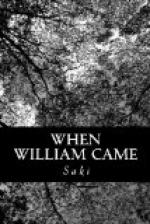“Do I pay you?” asked Yeovil, feeling almost inclined to laugh; “I’m rather a stranger to the new order of things.”
“You pay me,” said the policeman, “and you receive a quittance for the sum paid,” and he proceeded to tear a counterfoil receipt for a three shilling fine from a small pocket book.
“May I ask,” said Yeovil, as he handed over the sum demanded and received his quittance, “what the red and white band on your sleeve stands for?”
“Bi-lingual,” said the constable, with an air of importance. “Preference is given to members of the Force who qualify in both languages. Nearly all the police engaged on Park duty are bi-lingual. About as many foreigners as English use the parks nowadays; in fact, on a fine Sunday afternoon, you’ll find three foreigners to every two English. The park habit is more Continental than British, I take it.”
“And are there many Germans in the police Force?” asked Yeovil.
“Well, yes, a good few; there had to be,” said the constable; “there were such a lot of resignations when the change came, and they had to be filled up somehow. Lots of men what used to be in the Force emigrated or found work of some other kind, but everybody couldn’t take that line; wives and children had to be thought of. ’Tisn’t every head of a family that can chuck up a job on the chance of finding another. Starvation’s been the lot of a good many what went out. Those of us that stayed on got better pay than we did before, but then of course the duties are much more multitudinous.”
“They must be,” said Yeovil, fingering his three shilling State document; “by the way,” he asked, “are all the grass plots in the Park out of bounds for human feet?”
“Everywhere where you see the notices,” said the policeman, “and that’s about three-fourths of the whole grass space; there’s been a lot of new gravel walks opened up in all directions. People don’t want to walk on the grass when they’ve got clean paths to walk on.”
And with this parting reproof the bi-lingual constable strode heavily away, his loss of consideration and self-esteem as a unit of a sometime ruling race evidently compensated for to some extent by his enhanced importance as an official.
“The women and children,” thought Yeovil, as he looked after the retreating figure; “yes, that is one side of the problem. The children that have to be fed and schooled, the women folk that have to be cared for, an old mother, perhaps, in the home that cannot be broken up. The old case of giving hostages.”
He followed the path alongside the Serpentine, passing under the archway of the bridge and continuing his walk into Kensington Gardens. In another moment he was within view of the Peter Pan statue and at once observed that it had companions. On one side was a group representing a scene from one of the Grimm fairy stories, on the other was Alice in conversation with Gryphon and Mockturtle, the episode looking distressingly stiff and meaningless in its sculptured form. Two other spaces had been cleared in the neighbouring turf, evidently for the reception of further statue groups, which Yeovil mentally assigned to Struwelpeter and Little Lord Fauntleroy.




